
A RETIRED company director and emergency Blood Bike rider meticulously planned his own death, an inquest heard, because he could not face life after his marriage broke down.
Bruce Isambard Howard, 59, took his own life at his Bradford on Avon home between January 6-10. He and his wife, Sarah, a university lecturer, had separated several months earlier.
The inquest in Salisbury was told that Mr Howard was found dead in bed on January 10 at his home at The Old Sunday School, Coppice Hill, Bradford on Avon, while his wife was in Australia.
He had sent a suicide note to Trowbridge police station, addressed to the senior duty officer.
The note stated clearly his intention to take his own life and gave instructions on where to find his house keys.
In the note, Mr Howard warned that he had used nitrogen gas to commit a peaceful suicide and apologised to police for the grim task of recovering his body.
When police arrived at his home, they found his white Lexus car on the drive, a note taped to the front door warning about the gas and two gas cylinders of different sizes outside his bedroom door.
They discovered his body in bed, with soft music playing on a radio, and an envelope addressed to the Wiltshire & Swindon coroner on a bedside cabinet containing his passport and photo driving licence.
Downstairs, police found his will and instructions on how to look after his cat, which was being fed from an automatic dispenser.
Because of the circumstances of his death, police were forced to call in the Dorset & Wiltshire Fire and Rescue Service to help make the scene safe so that his body could be recovered.
Mrs Howard told the inquest that their marriage had broken down following her husband’s retirement in 2016. Although they had agreed to lead separate lives, they had not divorced.
She said she had last seen her husband on December 5 before leaving for Australia for Christmas and the New Year. Mr Howard was planning to carry out Blood Bike shifts over the festive period.
Neighbours told the assistant coroner Ian Singleton that Mr Howard had become more reclusive and was worried about money, the prospect of divorce and having to live on his own and start again.
One close friend and neighbour, Subashni Steinburg, said Mr Howard had lost weight and had become more reclusive following the breakdown of his marriage.
She said he had spoken of his fears of having to go back to work, sell his home and having to move away from Bradford on Avon, adding: “His whole demeanour was that of a broken man. He could not see the way forward.”
She said she had talked to him on social media between December 15 and January 6 and had last seen him on January 6.
Another friend, Peter Deacon, told the inquest that he had last seen Mr Howard on December 23 and that he was angry and upset about how much he might lose in a divorce.
The coroner said the note left by Mr Howard, who had been diagnosed as a diabetic, had made it clear that he intended to take his own life and the reasons why.
Forensic scientist Dawn Reed said she had found nitrogen in Mr Howard’s blood, which would have caused fatal hypoxia, and this was confirmed as the cause of death by consultant pathologist Matthew Flynn.
Returning a conclusion of suicide, Mr Singleton said the breakdown of the Howard’s marriage had forced Mr Howard to make changes in his life that he resented.



Comments: Our rules
We want our comments to be a lively and valuable part of our community - a place where readers can debate and engage with the most important local issues. The ability to comment on our stories is a privilege, not a right, however, and that privilege may be withdrawn if it is abused or misused.
Please report any comments that break our rules.
Read the rules hereComments are closed on this article